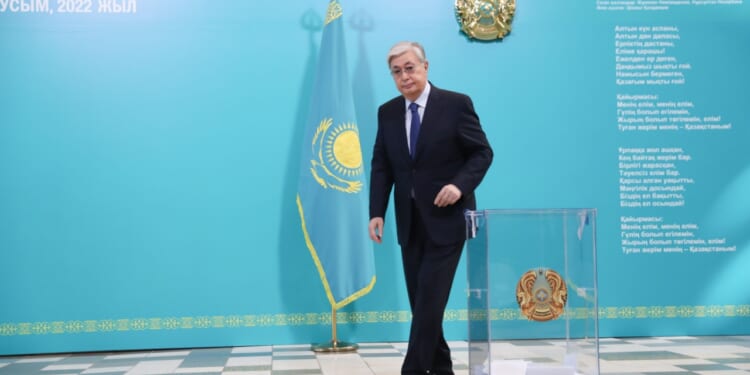With Astana’s entry, the Abraham Accords have entered into a new phase.
Today, in a monumental step, Kazakhstan joined Israel, the United Arab Emirates, Morocco, Bahrain, and Sudan as the sixth member of the Abraham Accords.
The decision may come as a surprise to many observers, who have focused on the prospect of normalization between Israel and the Arab world, especially since it occurred just days before Syrian president Ahmed al-Shara and Saudi crown prince Mohammed bin Salman’s visit to Washington. Yet Astana’s accession marks a significant new phase for the accords, one that has been in development over recent months with profound implications for the Middle East’s future.
As the first non-Arab Muslim-majority country to join the agreement, Kazakhstan sets an important precedent that widens the aperture of the accords beyond the Middle East and could transform the agreement into a true platform for multilateral cooperation. Given rivalries in Central Asia, the move opens the possibility for other countries with existing ties with Israel, such as Azerbaijan and Uzbekistan, to take similar steps. Kyrgyzstan and Tajikistan will also be watching closely. Should Uzbekistan follow Kazakhstan into the accords, it could drive a broad coalition within the C5+1 to join, opening the possibility for enhanced strategic cooperation between Israel, the United States, and the Central Asian states.
Kazakhstan’s entry was strategic and deliberate—it brought Astana closer to President Trump and gave it the polish to outshine Uzbekistan, Kyrgyzstan, Tajikistan, and Turkmenistan at today’s C5+1 Summit at the White House. The administration has quietly engaged Central Asian capitals on joining the accords since the start of its term, especially as a way to help turn the page on the Gaza war once a ceasefire and hostage release deal was reached. The timing of today’s announcement, only hours ahead of the C5+1 summit, gives the United States leverage to double down on Central Asia as the next frontier for the accords and to encourage the region’s leaders to take similar steps in short order.
New avenues of strategic cooperation will be available with a broader coalition of Central Asian states. The United States could establish a C6+2 framework, building on the C5+1, with the addition of Israel and Azerbaijan, to focus on regional security and cooperation regarding rare earth elements. The combination of the newly brokered peace deal between Armenia and Azerbaijan and the growing viability of the Middle Corridor, connecting Central Asia to the Mediterranean through the Caucasus, creates opportunities for Washington, Israel, and others to access Central Asia’s vast mineral wealth reserves.
This opening, coupled with announcements to activate the Turkey-Syria transit corridor and reconstruct the Hejaz railroad from Jordan, Syria, and Turkey, presents an opportunity to connect trade flows from Central Asia with the India-Middle East-Europe Economic Corridor (IMEC). This transformative infrastructure project will connect India to Europe through the Middle East, with Israel serving as the primary point of entry into the Mediterranean.
However, the United States will need to consider another key actor, Turkey, before continuing to expand the Abraham Accords throughout Central Asia and the Caucasus. While Ankara is unlikely to interfere with President Trump’s diplomatic achievement, its influence with its Turkic cousins means it has the potential to play spoiler.
This is especially true given the state of Israeli-Turkish relations, which soured during the Gaza War as Ankara severed trade and economic ties with Israel, closed airspace to Israeli aircraft, and barred Israeli vessels from Turkish ports. If Washington can successfully bring Ankara on board and acknowledge its leadership role in the Caucasus, it could have an easier time expanding the accords and driving regional economic integration with the Middle Corridor and the IMEC.
Kazakhstan’s accession signals that the Abraham Accords are evolving beyond their original Middle Eastern framework. It also builds momentum for the Abraham Accords ahead of Shara and MBS’ visits to Washington. This new paradigm expands the initiative’s reach into Central Asia, transforming it from a regional agreement into a broader platform for Arab and Muslim-majority engagement with the United States and Israel. If successful, we could one day see the accords include members from regions like Southeast Asia and the Horn of Africa.
About the Authors: Emily Miliken and Gershom Sacks
Emily Milliken is the Deputy Director of the N7 Foundation.
Gershom Sacks is the Director of the N7 Foundation and previously served at the National Security Council as Director for Gulf Affairs, Director for Transnational Affairs, and Policy Advisor to the White House Coordinator for the Middle East and North Africa.
Image: Pavel Mikheyev / Shutterstock.com.


















